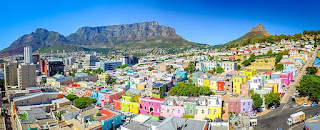Cape Town
Cape Town, located on the southwestern coast of South Africa, has a rich history and offers a variety of attractions. Here's an overview of Cape Town's history, along with some interesting facts and popular attractions:
History :
- Indigenous inhabitants: The Cape Town area was originally inhabited by the indigenous Khoisan people, who lived in the region for thousands of years.
- Dutch settlement: In 1652, the Dutch East India Company established a supply station at the Cape of Good Hope, led by Jan van Riebeeck. This marked the beginning of European settlement in the region and the foundation of Cape Town.
- British colonial rule: The British occupied Cape Town during the Napoleonic Wars in 1795 and eventually gained control over the Cape Colony in 1806. British influence continued until South Africa gained independence in 1961.
- Apartheid era and post-apartheid: Cape Town played a significant role in the anti-apartheid struggle, and the city witnessed protests and activism against the discriminatory policies. Since the end of apartheid, Cape Town has grown into a multicultural and vibrant city.
Attractions :
Table Mountain : One of Cape Town's most iconic landmarks, Table Mountain offers breathtaking views of the city and the surrounding coastline. Visitors can hike to the top or take a cable car ride to enjoy the panoramic vistas.
Robben Island: Located just off the coast of Cape Town, Robben Island is a UNESCO World Heritage site and a symbol of the country's struggle against apartheid. It served as a prison for political prisoners, including Nelson Mandela. Guided tours offer insights into South Africa's history and the experiences of the inmates.
V&A Waterfront: The Victoria & Alfred Waterfront is a bustling tourist hub with a wide range of shops, restaurants, entertainment venues, and a stunning harbor. It's a great place to enjoy shopping, dining, live music, and take boat trips.
Kirstenbosch National Botanical Garden: Situated at the eastern foot of Table Mountain, Kirstenbosch is a beautifully maintained botanical garden known for its diverse plant species and stunning landscapes. It offers walking trails, picnic spots, and outdoor concerts during the summer months.
Cape Point: Located within the Table Mountain National Park, Cape Point is where the Atlantic and Indian Oceans meet. Visitors can enjoy spectacular views, explore hiking trails, and visit the iconic Cape Point Lighthouse.
Video Cape Town
Language :
The official languages of South Africa are English, isiZulu, isiXhosa, Afrikaans, Sesotho, Setswana, Xitsonga, siSwati, Tshivenda, and isiNdebele. However, the most commonly spoken languages in Cape Town are:
- English : English is widely spoken and understood throughout Cape Town. It serves as a lingua franca for communication among people from different language backgrounds and is the language of business, education, and government.
- Afrikaans: Afrikaans is a language derived from Dutch, and it has roots in the history of Cape Town. It is spoken by a significant portion of the population, especially among the Coloured community, which has a mixed heritage of African, European, and Asian ancestry.
- IsiXhosa: IsiXhosa is one of the official languages of South Africa and is predominantly spoken by the Xhosa ethnic group. Many Xhosa-speaking people reside in Cape Town, and it is also the native language of former South African President Nelson Mandela.
In addition to these languages, you may also hear other indigenous languages such as isiZulu, Sesotho, and Setswana, spoken by smaller communities within Cape Town. The linguistic diversity of Cape Town reflects the multicultural fabric of South Africa as a whole. English is commonly used for tourism and communication with visitors, so language barriers are generally minimal for English-speaking travelers.
Facts :
- Cape Town is known for its stunning natural beauty, with its unique geography surrounded by mountains, vineyards, and pristine beaches.
- The Cape of Good Hope, located south of Cape Town, was a strategic landmark for European explorers seeking trade routes to the East.
- Cape Town is home to the colorful Bo-Kaap neighborhood, known for its vibrant Cape Malay culture, brightly painted houses, and delicious cuisine.
- The Cape Town International Jazz Festival, held annually, is one of the largest jazz festivals in Africa and attracts renowned musicians from around the world.
- Cape Town has a Mediterranean climate, with mild, wet winters and warm, dry summers.
- Cape Town's history, natural beauty, and diverse attractions make it a captivating destination for visitors. Whether exploring its historical sites, enjoying outdoor activities, or immersing in its vibrant culture, there's something for everyone to experience and appreciate in this beautiful city.





0 Comments